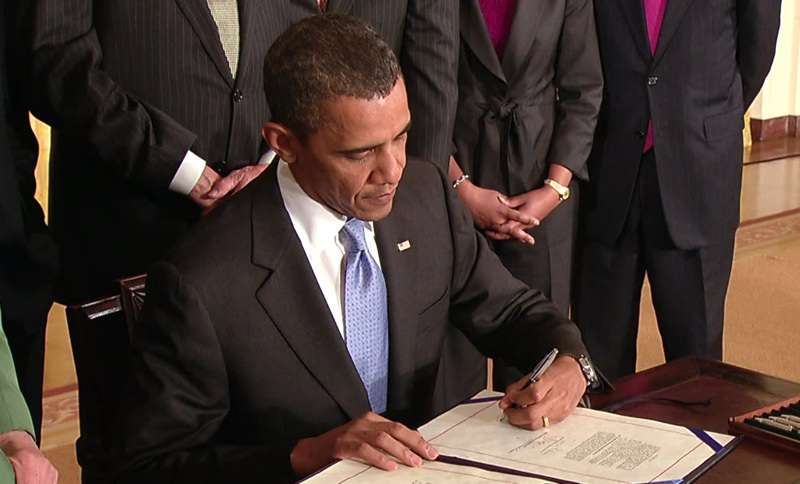Iran Nuclear Deal Pits the Obama Administration Against GOP Hawks

The Obama administration announced last night that it had reached what President Obama describes as "a comprehensive long-term deal with Iran that will prevent it from obtaining a nuclear weapon."
Obama declared this morning that the deal is "not built on trust" but instead relies on verification by independent inspectors that Iran is not pursuing technology that could lead directly to nuclear weapons.
According to The New York Times, the deal "would extend to a year the amount of time it would take Iran to make enough material for a bomb should it abandon the accord and race for a weapon — what officials call 'breakout time.'" However, under the terms of the deal, that time would likely shorten, perhaps by quite a bit, after a decade.
Politically, the deal pits Republicans against the Obama administration, with congressional Democrats stuck somewhere in between.
The Obama administration is aggressively arguing that the deal is the best option for containing one of the world's most potentially dangerous nuclear threats. In Slate, Ploughshares Fund President Joe Cirincione, author of the book Nuclear Nightmares: Securing the world Before it's Too Late, makes a detailed case for the deal, arguing that it "reverses and contains what most experts consider the greatest nuclear proliferation challenge in the world." Cirincione says that the deal "eliminates the three ways Iran could build a bomb"—with uranium enriched in centrifuges, with plutonium made using nuclear reactors, and in a secret facility.
The verification and monitoring system required by this deal makes that all but impossible.
Inspectors will now track Iran's uranium from the time it comes out of the ground to the time it ends up as gas stored in cylinders. There will be state-of-the-art fiber-optic seals, sensors, and cameras at every facility, inventories of all equipment, tracking of scientists and nuclear workers, and 24/7 inspections. Inspectors will also monitor the manufacture of all centrifuges and related machinery. A special "procurement channel" will be set up through which all of Iran's imported nuclear-related equipment must go.
This makes it extraordinarily difficult for Iran to cheat.
Despite the Obama administration's prioritization of the deal, some Democratic legislators are nervous about the details, according to National Journal.
Virtually all of the Republican presidential candidates have, rather predictably, come against the agreement. Jeb Bush, for example, calls it "a dangerous, deeply flawed, and short sighted deal." Scott Walker promised to "terminate" it on day one of his presidency. Florida Sen. Marco Rubio, perhaps the most hawkish of the top-tier Republican candidates, is circulating an online petition opposing the deal. Bush and Walker are following the likes of Senate GOPers like Tom Cotton, who opposes any deal whatsoever.
Former Republican Speaker of the House Newt Gingrich outlines the basics of the case against the deal, saying that it provides billions in aid that will be used to fund terrorism, that it will "increase the prestige of the Iranian dictatorship," and that it will grant international approval to the Iranian nuclear program, which will then "go full-speed ahead."
Is there an alternative that Republicans would prefer? Christopher Preble of the Cato Institute suggests that for Sen. Cotton and other Republicans, "you don't negotiate with a regime like Iran's—you destroy it."
Details of the 100-page deal are still being scoured over, and critics will no doubt have many objections. But Preble argues that simply objecting to the specifics in this agreement isn't enough, especially given the history of foreign policy failures in the Middle East.
Counter proliferation by means of regime change has a bad odor today, thanks chiefly to the Iraq war that, coincidentally, many of the most outspoken Iran deal opponents had a hand in pushing on the American people beginning in the late 1990s.
They have learned nothing, it appears, but most Americans have: refusing to engage diplomatically with an odious regime, or waging war to separate said regime from its weapons – by removing the regime from power – is a costly proposition, and there is no guarantee that the government that emerges in its place will be better than that which came before. George W. Bush came around to this view by the middle of his second term in office: the man who in 2002 cast Iran as a charter member of the Axis of Evil – along with Iraq and North Korea – supported the P5 + 1 negotiating process that eventually led to today's deal.
So keep all this in mind in the coming weeks as the details of the Iran deal are debated in Washington and around the country. Deal opponents have an obligation to describe their preferred alternative, not merely what they are against.
The deal, as Reason's Shikha Dalmia wrote this morning, may turn out to be the worst possible option—except for all others.


Show Comments (288)